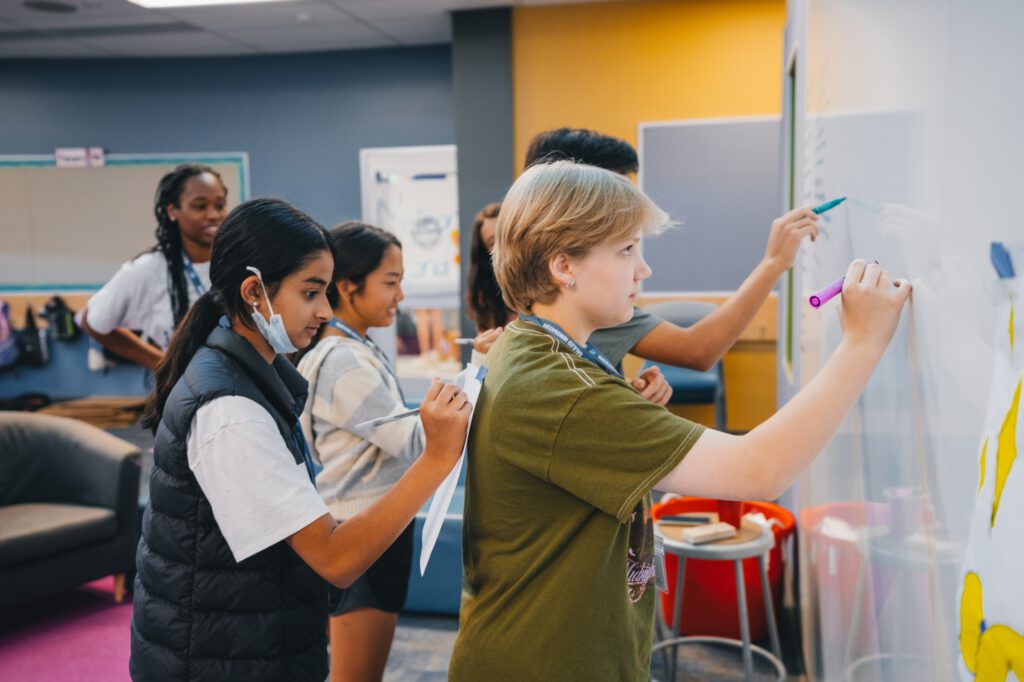Gamification: it’s a buzzword in education today, referring to the application of game elements to an unrelated field such as sales or learning. No one would deny the draw of games for kids; they provide a powerful and motivating option for learning. By some counts, 97% of kids and teens play at least one hour per day. But can video games really make kids smarter? If so, which ones and how does it work? And are there ways to help kids translate their gaming skills into the wider world?
What Does the Research Say?
In contrast to past research citing the negative psychological effects of video games, the American Psychological Association (APA), published a 2013 study finding “that video games provide youth with immersive and compelling social, cognitive, and emotional experiences. Further, these experiences may have the potential to enhance mental health and well-being in children and adolescents.” They summarized the potential benefits in four domains:
- Cognitive – Though it is commonly assumed that game players are intellectually lazy, the APA research demonstrated that video games positively impact a wide range of cognitive skills, beginning with spatial awareness. Not surprisingly, it is the games where kids must take aim at a target that have the greatest effect on cognitive attention and spatial sense. Once learned, these skills are easily transferable to other contexts. All genres of games are associated with enhanced problem-solving skills and creativity.
- Motivational – Video games help kids build motivation incrementally as they advance through levels and earn points or rewards. The best video games continuously adjust the “sweet spot” between challenge and frustration, keeping kids engaged despite failures. The study showed that this aspect of gaming creates a “persistent, optimistic motivational style” and contributes to a growth mindset.
- Emotional – On the most basic level, gaming is play, which makes kids happy. Studies suggest that puzzle-type games such as Candy Crush Saga and Angry Birds which require “minimal interfaces [and] short-term commitments” can improve mood, promote relaxation and decrease anxiety. Researchers also cite the development of reappraisal skills—i.e., the ability to re-evaluate and adjust—to the changing rules as video games level up. This adaptive skill helps kids learn to deal with anxiety and frustration and is transferable to contexts outside of the game.
- Social – One of the biggest changes in the evolution of video games has been the increasingly social nature of the experience. With the majority of gamers playing cooperatively or competitively with friends, video games contribute to the development of social skills, especially when players are rewarded for cooperative and helping behaviors. There is also preliminary evidence that kids involved in civic engagement through gaming become more involved in real life (for example, raising money for charity, volunteering their time and encouraging civic responsibility).
In addition to the life skills built more generally through video gaming, the APA also cites some specific applications where games show promise. Specially designed games have been used to help young cancer patients believe they can “crush” their disease. There is also tremendous potential for the development of therapeutic video games that assist with the cognitive behavioral therapy so important in the treatment of mental illness. By providing an engaging, immersive experience through which players can practice problem-solving and coping skills, games could be an inexpensive and accessible intervention. And, of course, educators are finding new applications for gaming every day to develop skills in the classroom, on the field and even teaching teens to drive automobiles.
From Avid Player to Content Creator
Aside from the positive impact that they receive from playing video games, there is another set of life skills acquired when kids learn to create and program games. These technical skills are accessible to kids through a summer camp, such as Galileo Summer Quest, which emphasizes design thinking. Grounded in the Galileo Innovation Approach®, all majors celebrate creativity and empower kids to bring their ideas to life. Besides learning a process for developing their game ideas, GSQ campers learn the specific technical skills that support their game platform.
- Mod Design with Minecraft® — Clive Thompson, author of Smarter Than You Think: How Technology Is Changing Our Brains for the Better, has called Minecraft® a “stealth gateway to the fundamentals, and the pleasures, of computer science.” One of the top five best-selling games of all time, it helps kids develop computational and innovative thinking. Campers invent, collaborate and share their unique modifications, utilizing feedback to make improvements and stretch their abilities.
- Mobile Game Design — For many gaming enthusiasts, the opportunity to tinker with and invent a game from their own imagination is a dream come true. Throughout the development and testing process, campers gain communication, collaboration and self-management skills as they work together to overcome obstacles and bring their projects to completion. At the end of the week-long session, kids have games they can share with family and friends, as well as confidence in their ability to successfully develop and program a game of their own.
- Virtual Reality — Adding a new dimension to video games, virtual reality puts the player inside an immersive world where they experience the game in 3-D. Developers must envision and code all aspects of their environment as they stretch their creative and technical skills to produce a realistic experience for users.
Gaming Builds 21st Century Skills
The sense of accomplishment kids feel when creating something as cool as a video game cannot be underestimated. The last thing they are likely thinking is that the experience has made them smarter. But research suggests playing games enhances cognitive, motivational, emotional and social growth. These important life skills are transferable and applicable to school, careers and all future life endeavors. And when kids get involved in game development at summer camp, they learn a process for innovation and valuable coding skills. As kids develop their creative confidence, problem-solving, collaboration, and logical thinking through the power of play, they are building important literacy skills for the 21st century. In other words, they are getting smarter.
To give your kids an opportunity to develop life skills through gaming, check out these camps in your area: San Francisco, Southern California, and Chicagoland. Register for a camp session or sign up for our mailing list to keep up-to-date with camp happenings and innovation resources. Or, for more information about Galileo camps, contact us here.





